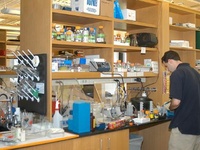“The reason that Summers is ‘congratulating’ Harvard is because the University did not fire its one tenured Fifth Amendment witness,” says Ellen Schrecker ’60, a professor at Yeshiva University and the author of No Ivory Tower: McCarthyism and the Universities.
“It did, however, get rid of untenured people. It just simply eased them out,” she says. “This was what every university was doing at the time. Harvard was no better than any school and it was no worse.”
Jobs in Jeopardy
With a finding of “grave misconduct” on his record for three years, Furry was not promoted from associate professor to full professor until 1962, but he fared better than Kamin and Markham, who did not have tenure.
Neither of their positions were renewed at the end of their terms, and both had trouble finding new jobs.
Kamin taught at a Canadian university until the late 1960s, when he was hired by Princeton’s psychology department, which he eventually chaired. Markham got a job at Albert Einstein Medical School, one of the few institutions that would hire blacklisted academics.
During the 1950s, at least five other non-tenured faculty appointees had their jobs put in jeopardy when Dean of the Faculty McGeorge Bundy questioned them about possible communist ties, according to Schrecker’s book.
Four of them left the University.
The fifth, History of Science graduate student Everett I. Mendelsohn, told Bundy he had never been a member of the Communist Party. He was allowed to stay and is now a professor in the department.
“As you can imagine, for a first-year graduate student about to become a teaching fellow, that was not a very comfortable moment,” says Mendelsohn, who received tenure in 1960. “Certainly other people were treated much more harshly.”
Mendelsohn says that he ran into Bundy at the bank several years after the incident. The former dean apologized to him, and told him that the University only suspected Mendelsohn because his name had turned up on a list Harvard bought from anti-communist groups.
Mendelsohn says his name may have appeared on the list because he had been a politically active pacifist in college.
Another member of the faculty who was suspected to have communist associations was Harvard Business School (HBS) Assistant Professor Raymond S. Ginger.
In 1954, HBS administrators questioned Ginger, a professor who had done research on Socialist Party leader Eugene V. Debs. FBI files show that HBS had been given an anonymous tip that Ginger and his wife, civil rights lawyer Ann Fagan Ginger, were likely to be called before the Massachusetts Commission to Investigate Communism.
When Ray and Ann Ginger refused to answer questions about their affiliation with the Communist Party, the administrators asked Ray Ginger to resign. He and his wife, who was pregnant at the time, were told that he would only receive the last month of pay remaining on his contract if the family left the area immediately, according to Ann Ginger.
Read more in News
Pataki: 'Yale is Going to Crush Harvard'













